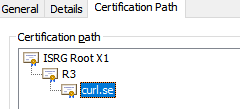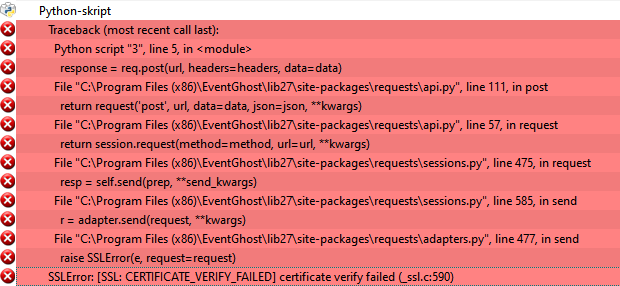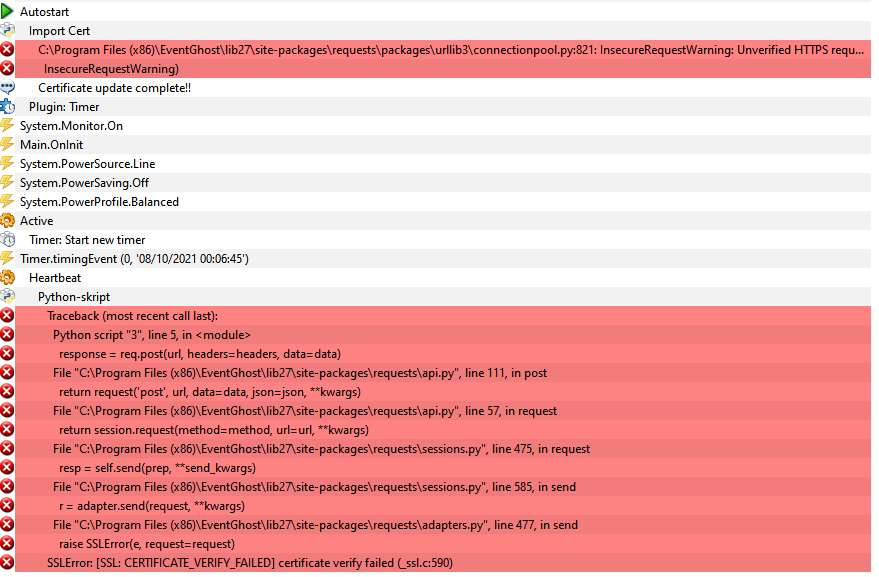New issue
Have a question about this project? Sign up for a free GitHub account to open an issue and contact its maintainers and the community.
By clicking “Sign up for GitHub”, you agree to our terms of service and privacy statement. We’ll occasionally send you account related emails.
Already on GitHub? Sign in to your account
SSLError: [SSL: CERTIFICATE_VERIFY_FAILED] certificate verify failed (_ssl.c:590) #415
Comments
|
The solution seems to be to get Python to trust the new Certificate ISRG Root X1 |
|
Hi, did you fixed it? any advice how to do |
|
I didn't |
|
Oh :( |
|
you will need to start EventGhost as an Administrator. (right click EventGhost icon and click on "Run as Administrator" in the menu. Make a new Python Script action and copy and paste the code below into that action. Then run the action. This will update the certificate file that is included with EventGhost. Report if it works or if it did not please. If it didn't any errors you get can you please copy them from the log and paste them into a reply here. import requests
import certifi
content = requests.get('http://curl.se/ca/cacert.pem').content
path = certifi.where()
with open(path, 'w') as f:
f.write(content)
print('Certificate update complete!!') |
|
not sure why certificates are being used for a non secure connection. If you don't use EventGhost to connect to any webpages on the internet you can use this code in a Python Script action as well. After you get the python script action made then save your EG session and then restart EG. You do not have to have administrative privlages for this to work. import sys
import requests
eg.globals.original_get = getattr(eg.globals, 'original_get', requests.get)
def get(url, params=None, **kwargs):
if 'verify' not in kwargs:
kwargs['verify'] = False
return eg.globals.original_get(url, params=params, **kwargs)
sys.modules['requests'].get = get |
|
EG doesn't use the windows certificate store. It uses something different. The issue is being caused by a change to one of the root certificates and that new certificate is being used by websites and the certificate that EG has is an old one so it cannot verify the certificate. |
|
If you want to give it a go again to download a new version of the certificates instead of disabling verification of them (that is what is being done in the script above) you can use this code . import requests
import certifi
content = requests.get('http://curl.se/ca/cacert.pem', verify=False).content
path = certifi.where()
with open(path, 'w') as f:
f.write(content)
print('Certificate update complete!!') |
Sadly no dice. |
|
That's fine if it is stored in the zip file containing the libraries. Use the script below and add it to your Autostart group at the top. This way the certificate bundle will always get updated when you startup EG as an Administrator. If you do not startup EG as an administrator an error will get printed out (this may only happen on Windows 10). import requests
import certifi
import os
try:
content = requests.get('http://curl.se/ca/cacert.pem', verify=False).content
path = os.path.join9os.path.split(os.path.split(certifi.where())[0])[0], 'cacert.pem')
with open(path, 'w') as f:
f.write(content)
print('Certificate update complete!!')
os.environ['CURL_CA_BUNDLE'] = path
except Exception:
import traceback
traceback.print_exc()
|
I figured there was a parenthesis error or something so I changed line 8 to be:
|
|
OK lets do this the easy way and hard code the path. import requests
import os
try:
content = requests.get('http://curl.se/ca/cacert.pem', verify=False).content
path = r'C:\Program Files (x86)\EventGhost\lib27\cacert.pem'
with open(path, 'w') as f:
f.write(content)
print 'Certificate update complete!!'
os.environ['CURL_CA_BUNDLE'] = path
except Exception:
import traceback
traceback.print_exc() |
|
You have that last scrip placed at the top of the Autostart group? It needs to stay there as it makes a change to an environment variable that requests uses to locate the cacert.pem file. It has to run each and every time before any plugins load, |
|
OK I see where the problem is..
and the cacert.pem
LOL. would figure. I have a linux VM set up. Let me update Firefox on it and generate a cacert.pem file. You will have to change your script and drop the new pem file into your EventGhost directory. I will give you the new script once I make the file. |
|
ok change the script at the top of the autostart group to the code below restart EG import os
os.environ['REQUESTS_CA_BUNDLE'] = 'C:\\Program Files (x86)\\EventGhost\\lib27\\cacert.pem' |
|
the cacert file I attached on the post above was generated by Mozilla 6 days ago. If it doesn't work then I would imagine there is something wrong in your home assistant installation. You might have to bypass the verification of certificates which I posted a way to do. I will need to make some modifications to the script to disable the warnings you get in the log, but that is not a big deal. I can also set it up so that it will only disable the verification for your home assistant installation. The home assistant installation MUST have a static IP or a DNS name in order for me to do that. |
Thanks! Maybe a new release of EventGhost with a proper cacert would be in order? |
|
You need to leave the script there. If you don't want the script there you can set the environment variable in windows. Even if there is a release of EG that would allow for a download of the certificate file as you already found out it wouldn't have worked anyway because the file that is gotten via an automatic package update is gotten from there. I am going to let the makers of curl and also certifi know that they need to update the file. |
|
Ok I let both of those projects know they need to update the file. I can write a script that will check once a day to see if the script that Mozilla has is changed or not. That's about the best that I can do. I am pretty much at the mercy of curl and how quickly they update the file. You would think that they monitor what Mozilla has since they use the database in Firefox to build the file they use. Maybe they didn't know that Mozilla generated the same file.. dunno. https://github.com/curl/curl/issues/7836 Glad we got it sorted for the moment. I am going to put some thought into how I am going to go about writing an automatic download of the file. |
|
Hi. Thank you very much for this fix, AutoRemote: Send Message action from EventGhost AutoRemote plugin was producing the same error: The solution in @kdschlosser's post above fixes it. |
|
For the PushBullet addon, it has its own cacert.pem file stored in C:\ProgramData\EventGhost\plugins\PushBullet\lib\websocket__0440 that you need to update. May be true with other addons as well. Check in the plugin directory. |






Describe the bug
Since the start of October my Python script that talks to my Home Assistant server doesn't work.
To Reproduce
This is the code
Error from EventGhost
Expected behavior
That the connection can be done.
Additional context
From what I can tell this has something to do with Let'sEncrypts Root Certificate Expiring
https://www.socialgrep.com/search?query=%2Fr%2Feventghost
https://scotthelme.co.uk/lets-encrypt-old-root-expiration/
Is the Python version signed against an old Certificate or what is the problem?
EventGhost version
Software
Program Version: 0.5.0-rc6
Build Time: Mon, 24 Dec 2018 09:01:48
Python Version: Stackless Python 2.7.12 final 0
wxPython Version: 3.0.2.0
System
Operating System: Microsoft Windows 10 (Unknown Edition 101), 64-bit (build 19043)
CPU: Intel(R) Core(TM) i7-6700K CPU @ 4.00GHz
RAM: 31.9 GB
The text was updated successfully, but these errors were encountered: